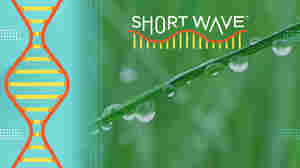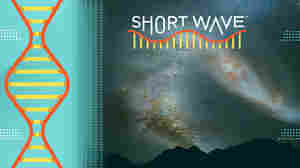In Kelly Lambert's lab at the University of Richmond, rats are trained to drive tiny cars. Researchers are studying how that training, and the anticipation associated with it, affects their brains. University of Richmond hide caption
If you're hooked, try Short Wave Plus. Your subscription supports the show and unlocks a sponsor-free feed. Learn more at plus.npr.org/shortwave

Short Wave
From NPR
New discoveries, everyday mysteries, and the science behind the headlines — in just under 15 minutes. It's science for everyone, using a lot of creativity and a little humor. Join hosts Emily Kwong and Regina Barber for science on a different wavelength.
If you're hooked, try Short Wave Plus. Your subscription supports the show and unlocks a sponsor-free feed. Learn more at plus.npr.org/shortwave
Most Recent Episodes
Embers are blown off a burning tree as the Eaton Fire burns in Altadena, Calif. As of Thursday morning, the fire had ballooned to 10,600 acres. Red flag warning have been extended through Friday for wind-prone areas. Nic Coury/AP hide caption
A robot roams through rows of grapes at Cornell AgriTech's Geneva vineyards to look for signs of diseased plants. Allison Usavage/Cornell University hide caption
Aboard the International Space Station, astronauts cut their hair using a pair of electrical sheers connected to a vacuum. NASA astronaut Frank Rubio says, "It's not a pretty haircut, for sure." Getty Images hide caption
Matter and its weird, opposite antimatter annihilate each other "in a blaze of glory," says Jessica Esquivel, an experimental particle physicist at Fermilab. PeteDraper/Getty Images hide caption
Ghost particles are blasting through you. Can they solve an antimatter mystery?
Ghost particles are blasting through you. Can they solve an antimatter mystery?
Following his presidency, former President Carter devoted much of his life to creating a better world through attention to global health challenges, particularly "neglected" tropical diseases. The Carter Center hide caption
As his funeral service begins, a look at Jimmy Carter's Guinea worm legacy
As his funeral service begins, a look at Jimmy Carter's Guinea worm legacy
Need a better way to check the weather this summer? Try the dew point
Need a better way to check the weather this summer? Try the dew point
A NASA visualization showing the Milky Way and Andromeda at four billion years from now, if they make an encounter. Galaxy illustrations courtesy of NASA, ESA, Z. Levay and R. van der Marel (STScI) T. Hallas, and A. Mellinger. Visualization courtesy of NASA, ESA, and F. Summers (STScI) hide caption









